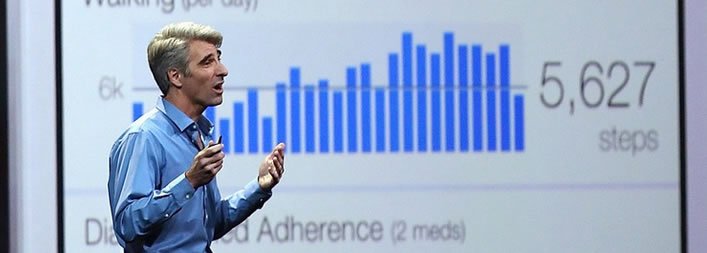Is Apple’s ‘HealthKit’ really set to revolutionise the healthcare industry, or is mHealth all hype?
Apple will be officially launching iOS 8 this autumn, and at the same time it will also launch HealthKit. This new health app will provide Apple smartphone/tablet users with a dashboard of their health and fitness data. They have also created a new API tool for developers which will enable other health and fitness apps to work together. HealthKit has already been integrated with Nike’s running apps and the Mayo Clinic app, which will allow blood pressure to be recorded.
Apple are saying that HealthKit is going to revolutionise the healthcare industry so is this all hype or can mHealth solutions in the shape of mobile apps really help to tackle some of the key problems our healthcare system faces?
New levels of patient engagement, as observed in many studies, are proving that patient outcomes are improved and costs reduced when patients are more involved in their own care. And the advent and continued development of mobile health apps (mHealth) is responsible for driving that patient engagement.
Studies have shown that on average, people check their phones 150 times a day. Healthcare providers have now realised the potential advantage of this “addiction” to engage with people over health issues.
The birth of mHealth could be attributed in large part to Joseph Kvedar, MD, the director of Partners HealthCare’s Centre for Connected Health in Boston. Since he first began to launch ‘connected health’ through technology some eighteen years ago, the landscape has changed dramatically. Kvedar started with telemedicine as well as dermatological imaging. The camera he used at that time had less than 1 megapixel resolution, and was the size of the average shoebox. It cost twelve thousand dollars. In those early days, videoconferencing capabilities cost fifty thousand dollars. Since then, technological changes have been dramatic, with the number of mobiles in use greater in number than landlines. Other tools like Skype and Facetime make it possible to videoconference anytime and anywhere.
Kvedar’s centre was also the origin of the moniker ‘connected health’ in 2005. This was in response to the lacklustre enthusiasm that there was to the terms telemedicine and telehealth. The mobile revolution was taking off at that time and now, it seems inconceivable to think of developing any program that does not involve the use of mobile technology.
From that point the rise and rise of mHealth has continued. It is now one of the most exciting prospects for the management and interaction of patients with health care provision that there has ever been. Along with the concept of meaningful use, another important factor that drives the patient engagement trend is the rise of models of accountable care along with payment restructurings. Under these accountable care models, health providers are responsible for the management of an entire population with payments based on results (keeping the population well and getting them better) rather than a fee based system based on services provided. This makes providers even more keen to find effective ways of engaging their patients in the management of their own health, in between visits to the surgery
Before rushing headlong into digital patient engagement tools, however it is worth mentioning information inheritance and the way in which most providers still currently engage with patients in their care. This includes printed copies of health records, discharge instructions, simple diagrams or descriptions of exercises, medication timetables, and other instructions. There is still reliance on phone call reminders follow-up phone calls and one to one conversation with healthcare providers.
So, while some of the expanding tools for digital patient engagement aim to be replacements for traditional channels, most aim to be a complementary or offer augmentation to existing channels of communication and contact. There is no doubt that mHealth has advanced fast since the iPhone came onto the scene just over 7 years ago. So, it will be interesting to see what impact Apple’s HealthKit is going to have on the healthcare sector and what health and medical apps we’ll have access to in 7 years from now.


Good article. I personally believe Apple will drive a huge change. Firstly because the devices are now already in many, many hands, and secondly they have already demonstrated their capabilities in protecting data within a very confined boundary where others have failed. Some even speculate Apple could break into the banking sector. Why not health!
Health is screaming out for innovation, and we’re right at that tipping point with so many consolidating factors pushing us to make a step change. Where however I’m a little bit more aprehensive is what Pharma is making of it all. Just wrote my own little article on that from the Pharmaco marketers perspective: http://pharmastrategic.com/2014/06/13/so-what-is-it-mobile-medical-device-mobile-medical-apps-standalone-medical-device-software-smds/
Thanks again for the good read.
Cheers,
Sven